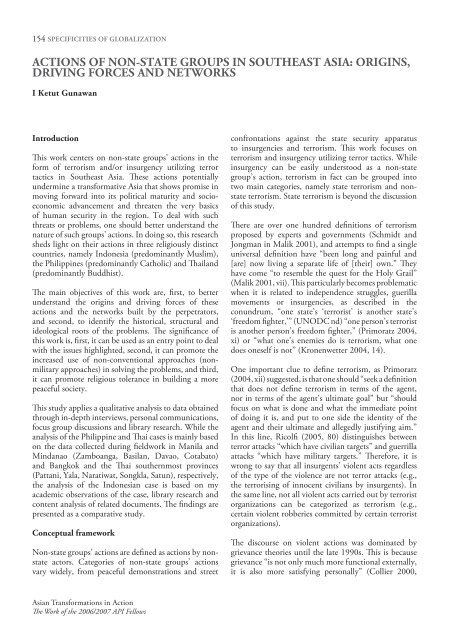Asian Transformations in Action - Api-fellowships.org
Asian Transformations in Action - Api-fellowships.org
Asian Transformations in Action - Api-fellowships.org
You also want an ePaper? Increase the reach of your titles
YUMPU automatically turns print PDFs into web optimized ePapers that Google loves.
154 SPECIFICITIES OF GLOBALIZATIONACTIONS OF NON-STATE GROUPS IN SOUTHEAST ASIA: ORIGINS,DRIVING FORCES AND NETWORKSI Ketut GunawanIntroductionThis work centers on non-state groups’ actions <strong>in</strong> theform of terrorism and/or <strong>in</strong>surgency utiliz<strong>in</strong>g terrortactics <strong>in</strong> Southeast Asia. These actions potentiallyunderm<strong>in</strong>e a transformative Asia that shows promise <strong>in</strong>mov<strong>in</strong>g forward <strong>in</strong>to its political maturity and socioeconomicadvancement and threaten the very basicsof human security <strong>in</strong> the region. To deal with suchthreats or problems, one should better understand thenature of such groups’ actions. In do<strong>in</strong>g so, this researchsheds light on their actions <strong>in</strong> three religiously dist<strong>in</strong>ctcountries, namely Indonesia (predom<strong>in</strong>antly Muslim),the Philipp<strong>in</strong>es (predom<strong>in</strong>antly Catholic) and Thailand(predom<strong>in</strong>antly Buddhist).The ma<strong>in</strong> objectives of this work are, first, to betterunderstand the orig<strong>in</strong>s and driv<strong>in</strong>g forces of theseactions and the networks built by the perpetrators,and second, to identify the historical, structural andideological roots of the problems. The significance ofthis work is, first, it can be used as an entry po<strong>in</strong>t to dealwith the issues highlighted, second, it can promote the<strong>in</strong>creased use of non-conventional approaches (nonmilitaryapproaches) <strong>in</strong> solv<strong>in</strong>g the problems, and third,it can promote religious tolerance <strong>in</strong> build<strong>in</strong>g a morepeaceful society.This study applies a qualitative analysis to data obta<strong>in</strong>edthrough <strong>in</strong>-depth <strong>in</strong>terviews, personal communications,focus group discussions and library research. While theanalysis of the Philipp<strong>in</strong>e and Thai cases is ma<strong>in</strong>ly basedon the data collected dur<strong>in</strong>g fieldwork <strong>in</strong> Manila andM<strong>in</strong>danao (Zamboanga, Basilan, Davao, Cotabato)and Bangkok and the Thai southernmost prov<strong>in</strong>ces(Pattani, Yala, Naratiwat, Songkla, Satun), respectively,the analysis of the Indonesian case is based on myacademic observations of the case, library research andcontent analysis of related documents. The f<strong>in</strong>d<strong>in</strong>gs arepresented as a comparative study.Conceptual frameworkNon-state groups’ actions are def<strong>in</strong>ed as actions by nonstateactors. Categories of non-state groups’ actionsvary widely, from peaceful demonstrations and streetconfrontations aga<strong>in</strong>st the state security apparatusto <strong>in</strong>surgencies and terrorism. This work focuses onterrorism and <strong>in</strong>surgency utiliz<strong>in</strong>g terror tactics. While<strong>in</strong>surgency can be easily understood as a non-stategroup’s action, terrorism <strong>in</strong> fact can be grouped <strong>in</strong>totwo ma<strong>in</strong> categories, namely state terrorism and nonstateterrorism. State terrorism is beyond the discussionof this study.There are over one hundred def<strong>in</strong>itions of terrorismproposed by experts and governments (Schmidt andJongman <strong>in</strong> Malik 2001), and attempts to f<strong>in</strong>d a s<strong>in</strong>gleuniversal def<strong>in</strong>ition have “been long and pa<strong>in</strong>ful and[are] now liv<strong>in</strong>g a separate life of [their] own.” Theyhave come “to resemble the quest for the Holy Grail”(Malik 2001, vii). This particularly becomes problematicwhen it is related to <strong>in</strong>dependence struggles, guerillamovements or <strong>in</strong>surgencies, as described <strong>in</strong> theconundrum, “one state’s ‘terrorist’ is another state’s‘freedom fighter,’” (UNODC nd) “one person’s terroristis another person’s freedom fighter,” (Primoratz 2004,xi) or “what one’s enemies do is terrorism, what onedoes oneself is not” (Kronenwetter 2004, 14).One important clue to def<strong>in</strong>e terrorism, as Primoratz(2004, xii) suggested, is that one should “seek a def<strong>in</strong>itionthat does not def<strong>in</strong>e terrorism <strong>in</strong> terms of the agent,nor <strong>in</strong> terms of the agent’s ultimate goal” but “shouldfocus on what is done and what the immediate po<strong>in</strong>tof do<strong>in</strong>g it is, and put to one side the identity of theagent and their ultimate and allegedly justify<strong>in</strong>g aim.”In this l<strong>in</strong>e, Ricolfi (2005, 80) dist<strong>in</strong>guishes betweenterror attacks “which have civilian targets” and guerrillaattacks “which have military targets.” Therefore, it iswrong to say that all <strong>in</strong>surgents’ violent acts regardlessof the type of the violence are not terror attacks (e.g.,the terroris<strong>in</strong>g of <strong>in</strong>nocent civilians by <strong>in</strong>surgents). Inthe same l<strong>in</strong>e, not all violent acts carried out by terrorist<strong>org</strong>anizations can be categorized as terrorism (e.g.,certa<strong>in</strong> violent robberies committed by certa<strong>in</strong> terrorist<strong>org</strong>anizations).The discourse on violent actions was dom<strong>in</strong>ated bygrievance theories until the late 1990s. This is becausegrievance “is not only much more functional externally,it is also more satisfy<strong>in</strong>g personally” (Collier 2000,<strong>Asian</strong> <strong>Transformations</strong> <strong>in</strong> <strong>Action</strong>The Work of the 2006/2007 API Fellows
















